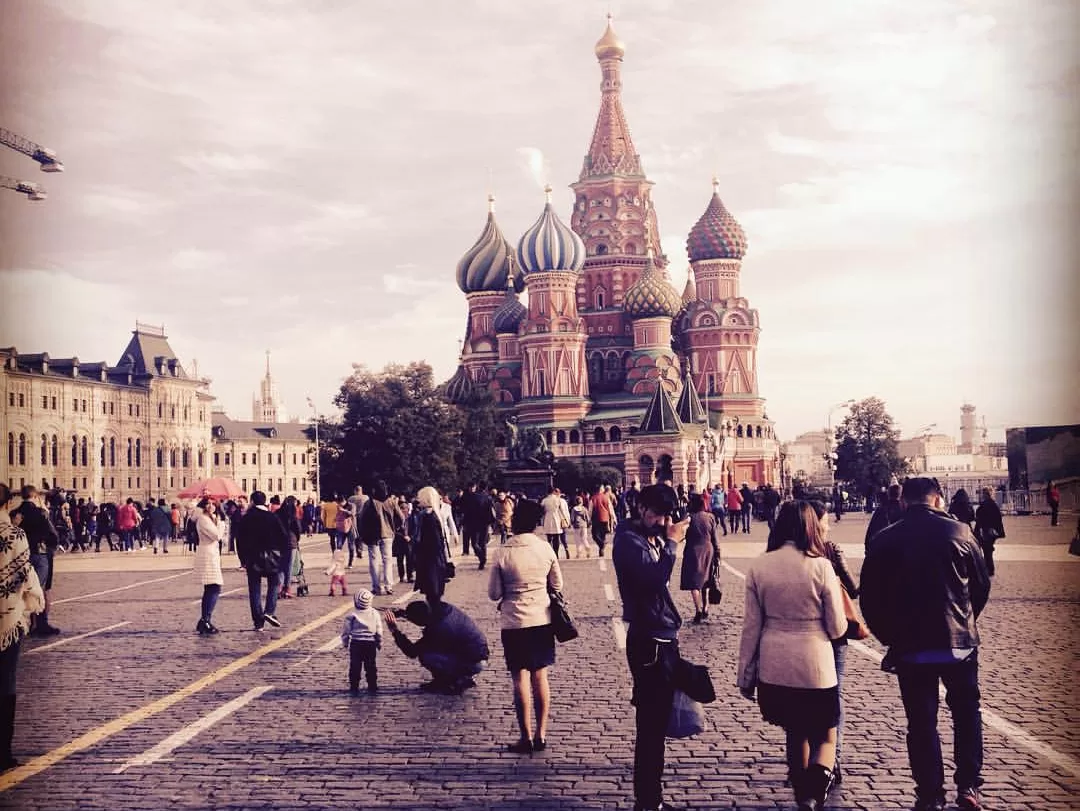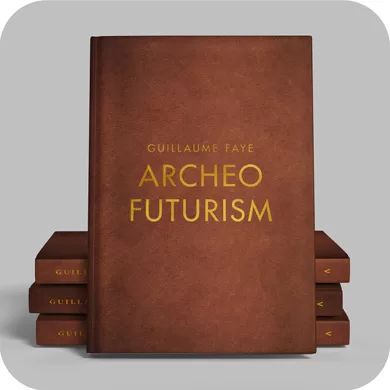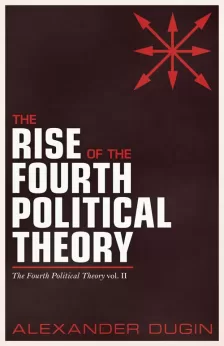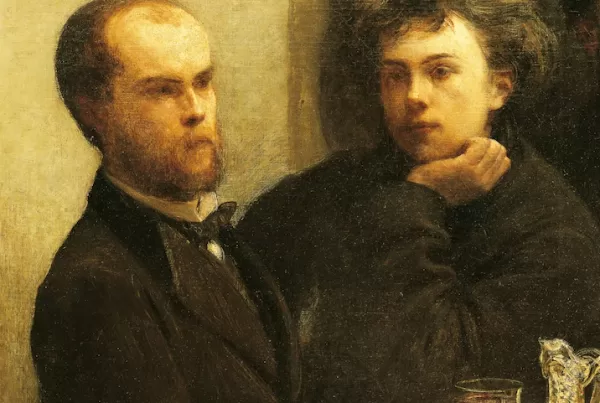
Some say it’s a Finnic word, Moskva, some say it’s proto-Slavic, whatever the case, you come here already with two images in your mind: Red Square and the Kremlin. Maybe St. Basil’s. This, for most people, is Moscow. It’s much more, but it takes a bogtrotter, a hillbilly, redneck, hick to explore it properly, thoroughly.
I explored mountains and valleys as a child, and not to sound like Greta Thunberg or some granola-snorting wide-eyed hippy but you start to see connections, how the river influences the types of grasses, the trees, the shade from the mountain says what will grow and how, water or lack of it, wind, altitude, etc., not so much the human, not us. In a city it’s all us, from the beginning to now, who determine how a city lives. It’s time plus human planning. In St. Petersburg, there is a short amount of time and a lot of planning, almost all planning. A narrow time frame, short, with overdoses of thought. It’s beautiful, intense, almost supernatural. Cloying. Cloying. Mayakovsky likened it to a cemetery. Moscow is completely different. It is chaos. If there has ever been a plan, it’s been lost or is a lie, if true, it’s not believed. In Russia people are divided into St. Petersburg people or Moscow people. It took me two trips before I started to have an interest in Petersburg. Four before I began to want to wander. In Moscow it took a couple of minutes, my first minutes outside the airport to be in thrall, love, to be curious. Ten years later and I still feel like a tourist. And, like I’ve been here for a hundred centuries.
The word flaneur is French. A man who wanders around a city, not a valley or mountain or desert, observing a city and its people, society. Baudelaire ,Walter Benjamin, Poe, Nassim Taleb… I don’t like the word, but it’s interesting to know there is a word for what I’ve been doing in Moscow and other cities. A flaneur has a loose plan, or none, ambles, meanders, exploring the city, discovering the city streets and its people, its connectedness. In Petersburg, atop many islands, planned out, are the wide streets, the same beautiful buildings and waterways, the beauty is almost too much, the thin light, gives Peter a strange appearance, of a cemetery, yes, but also of a movie set. Walking in the city you feel almost like it isn’t real, the next minute it feels more real than real, hyperreal. Canals, the smell of water, a park, statues, you feel the plan, the dead, Raskolnikov and his creator sullenly walk in the shadows, once I felt shivers thinking for sure the man behind me was carrying a tomahawk. His shadow was elongated, I stopped, he stopped, I walked, he walked. It looked, the shadow anyway, like a tomahawk. But then, we realized it was a bouquet of flowers that looked dead in the dead city. Petersburg, to a Muscovite or at least a Moscow lover, seems to be waking up or going to sleep, or maybe even a city that can’t sleep, which is different from a city that never sleeps. A city that never sleeps is on drugs, drinking, dancing, that city can be bombed and a new one made, anywhere, because we humans are really dumb. But a city that can’t sleep is in need of a psychiatrist. Sleeping pills. The people are grumpy, somber, gray. The Gulf of Finland is here blowing cold wind in your frigid face, your bones hurt, the water is everywhere, the clouds are like funerary shrouds, and bakeries are like toadstools in a forest… Petersburgers are addicted to pastry, every block has a bakery. So, you walk with coffee and a ponchik (Russian donut). There, that church is the Church on the Blood. The exact spot where the Tsar was blown to pieces by anarchists. Usually, you aren’t allowed to take photos in Russian churches, but this church, you’re allowed, it’s too beautiful.
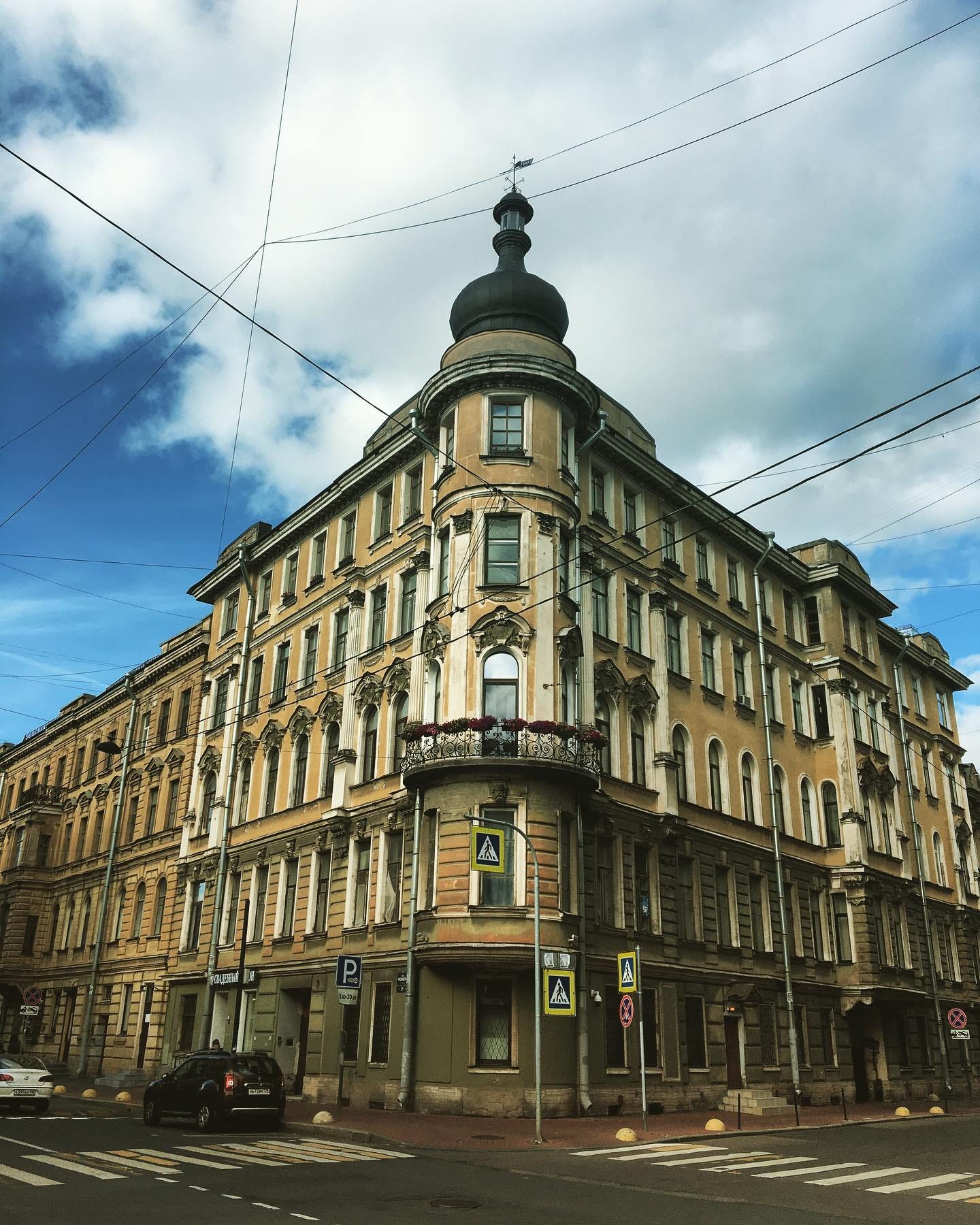
Petersburg is a plan under the influence of Albert Hofmann. The subway is below the water, so to get to the subway you ride an escalator for what seems like an eternity. The doors on the platform close and open, to shut out possible floodwaters. I’m not claustrophobic unless I’m in the Petersburg subway. And I begin to think of drowning. I obsess on it. The faces here, all perturbed, the women slightly overweight, not gorgeous. A St. Petersburg native told me: to find a beautiful girl and a nice-paying job I had to come here, to Moscow. I believe it. The old apartments in Petersburg, they’ll make you believe in ghosts. Wandering at night it looks on one hand beautiful, in every sense of the word, cloyingly so, but you cannot look away, and you realize the city is alive and is very vain and jealous, she cannot handle competition. So the beauties go to Moscow… Moscow is spirit, she is matter, she is gold, power, the most beautiful women you’ve ever seen, all culled from Russia’s corners and pockets, Moscow is Rome, there are Muslims, Buddhists, Germans, Italians, Northern tribespeoples, small and Asiatic, shamans, people with bizarre headgear, all selling, barking, walking, Moscow…
Moscow is chaotic. It is pell mell, din, quiet, random, there is the winding ox bows of the Moscow River, some hills and hundreds, thousands of churches. It is a holy city, a golden city. Under the Soviets many cities were changed to reflect the new ideology, the new masters. Petrograd became Leningrad, Novgorod became Gorky, Samara Kuibyshev, but Moscow… Even the Communists said… tovarich, wtf… it’s Moscow, we can’t change it.
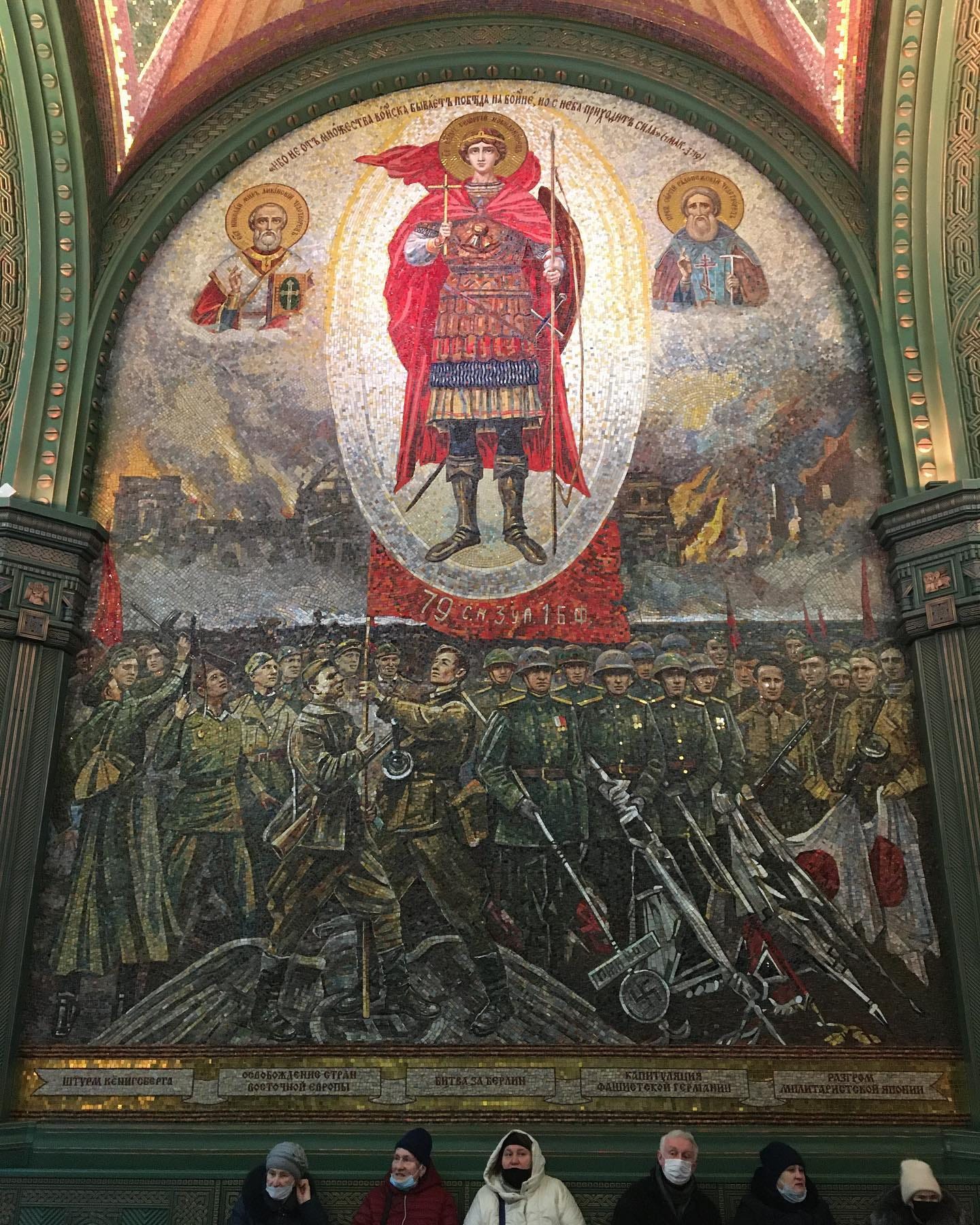
And the Communists abandoned Petersburg for Moscow, they returned to the Mother, to Moscow. Petersburg is beauty distilled and never ending, so much so, you may begin to feel depressed or agitated. In Moscow, you move and see the 14th-century monastery, next to it is a 19th-century 3-story building, next to it is a giant art nouveau church from 1910, then a Brutalist building, so ugly it’s handsome, a Benicio del Toro building. Then, a modern monstrosity, then construction. You can come down, or up, a street here a million times and one day, you encounter a 16th-century church behind modern office buildings, named after a Holy Fool. Or, suddenly you walk smack into a most unprison prison in a swank neighborhood, or an 1810 hospital in Lefortovo, the section of Moscow that Peter reserved for the inostranits, the foreigners, so even now Lefortovo has some German buildings and thousands of German dead in the cemetery. And French and English. And, in my opinion, the best banya, it’s not like Sandunny, downtown on a hill, famous and spectacular. My Lefortovo banya has criminals and old people and maybe cockroaches and every single time I come I get lost. In Moscow, the districts don’t melt into each other, they nestle, like a nest of creatures, different creatures, dragons, snakes, weasels, bears, vampires, werewolves, rabbits, deer, the real and imagined, with angels, all snuggling tight against each other, from downtown, the center, the center is the Kremlin. You aren’t prepared. I don’t care if you’ve seen it on CNN, in films, or seen a whatsapp photo from your favorite expat, until you see it, in person, and you feel it, alive, old, imposing and red. Massive and breathing, the stones talk in bass voices. They say, we know you, we have tasted blood and we are protected, know this, mortal. And every time I see it, I feel almost like I have to prostrate myself. At one end is St. Basil’s. In Russian. Vassily. Again a holy fool. The most famous Russian church and one of the most famous icons in a country of iconophiles, named after a holy fool. A chaos of color and emotion, life, it seems to be moving when it rains. I swear it moved meters from the last time I saw it, maybe it’s moving, this ensemble, Basil’s, the Kremlin, Red Square, from all angles, you feel power. Some heart, underground and above and around you, is beating. There is a connection between now and centuries ago. You see Marshal Zhukov on his horse, the clouds break and the sun spills, shoots rather onto him, nothing else, I’ve seen it many times, Zhukov in light and all around nothing but shadow of Kremlin walls, two minutes from Zhukov’s statue is Alexandrovsky Garden, the tomb of the Unknown soldier, the guards, the memorials, the birches and flowers, the strolling people, dressed up, Muscovites dress nicely, be aware. Even the lumpen gopniki dress up, their Adidas ensemble is clean, ironed, their gold teeth gleam, they squat like they are in the Encyclopedia of Squatting, OMON troops walk with machine guns, Kalashnikov (his statue is past the Hermitage Garden), large muscled men that could kill you in a nanosecond but play psychologist to the homeless drunk with a broken vodka bottle, grandfather let’s go home, this isn’t good, pick up the mess, he does, he explains his woes, his teeth don’t gnash any more. He disappears into a tunnel from the Kremlin gardens under Tverskaya Street to… to where? Teeming, thrumming city streets, a cemetery with revelers, an older graveyard, a strange one where people are flaneurs or cops, or food delivery people on scooters.

I am a Muscovite, I know this city like no other city I’ve lived in. I usually hate cities, but Moscow is the tsar of all cities, all the cities in my life are ruled by Moscow. Officially there are 12 million people here, unofficially some say 25 million. On the same latitude as the middle of British Columbia. Petersburg is nearly the same latitude as Anchorage. Think on that. Moscow and Peter are Northern cities, Hyperborean. In both, I always expect and see fur in the winter, sleds, the winter comes early and stays long. I expect to see armies of bears, polar bears and wolverines rampaging like furry Vikings.
In Moscow Circles by Venedikt Erofeev, a famous Russian dipsomaniac and author, the hero, Venichka, says in the beginning, the Kremlin, the Kremlin, I can’t seem to find it. Which is absurd, because the Kremlin finds you. You cannot miss it. But, in Moscow Circles (Moscow to Petushki in other translations) he cannot find and has never seen the Kremlin.
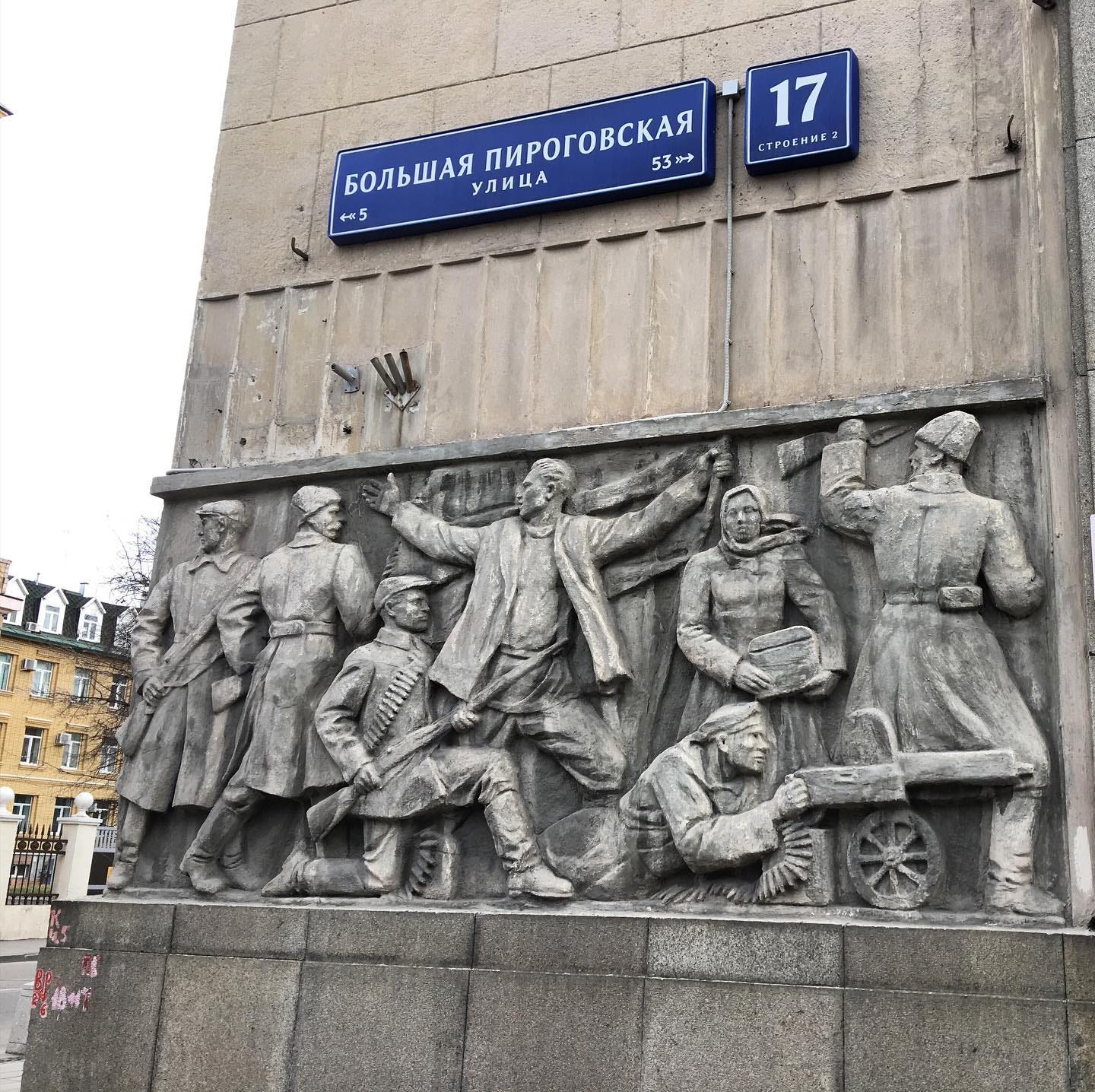
Petersburg, of course, is named after St. Peter, that’s official, but it’s also, I mean look at Peter the Great. A Westernizer, Westernized, Western-loved Tsar who burned the beards of Muscovite holy men, burned entire churches and killed his own son (like Ivan Grozny, unlike Grozny, Peter’s sin is forgotten or hushed up, all that matters is he had a mustache and a plan). It’s like if I built a city and named it Richardburg… after St. Richard, I tell you. My few friends would think, yeah, ok. Sure, pal. Then, I kidnap the Russian hillbillies and force them to clear the swamp and build the most beautiful city I can imagine, my progeny continue, the top architects arrive from Italy and eat red and white mushrooms and build garishly golden, straight streets, an explosion of line, of mind. A plan above Peter’s mustache, in Moscow the plan has vanished and some say there was no plan, the centuries all butt up against each other, like Moscow’s districts, like her buildings, the long-legged beauties, the Asiatic feeling of Moscow, it is here you see the Asian influence, the echoes of Mongolian, denge, the word for money is Mongolian and Moscow is denge. You want to make denge? Move East, young man. Peter is dead. Long live Moscow! Mongolian, Finnish, Slavic, powerful and humble, all at once.
Not really. Petersburg is never dead. And, you don’t have to choose one, or better yet, tell them both to not choose you, they try to, these cities of Russia, even the villages, oh, they try! They enter your brain, your soul, like beautiful kittens and soon they have kittens and the kittens have kittens and soon, it’s a poetic infestation, mewling in your mind, or something like this, whispering, you like me, choose me, two women, just don’t… kill the cats, stop your ears, you can like them both, maybe one more than the other, but the golden domes of Moscow! No, the canals of Petersburg…
I fell in love with Moscow terribly. Whoever gets used to it will not leave it. I am forever a Muscovite.
– Chekhov
The cats of Moscow are in a hurry. The cats of Petersburg are arrogant. The kitten of Suzdal tried to climb me like a tree, he purred and mewed, his tail was alive, he bit me softly, he followed us.
The villages of Russia, if I had to choose a place, one place, I’d not choose Moscow or Peter, or Kazan, Yekaterinburg, a village, somewhere in the middle of Moscow and Petersburg. Where the cats attack you.
The canals of Petersburg, the sound of water, the reflection of roofs, the buildings that seem to be the largest, the neo-classical, art nouveau, baroque, so many colors! On dark days dark clouds, on those light days when Petersburg smells good and fresh, the clouds like rolls in the sky, canals whisper, boats swoosh, smells conspire to be on their best behavior, and you start to think of moving here. You imagine yourself wandering the canalled streets, with a gut, eating a donut, hungover, into the night past the arches, running from Raskolnikov who is only a figment of your imagination, looking for Pushkin, Gogol, finding yourself at Blessed Xenia’s grave with hundreds of pilgrims, St. Xenia who was a flaneur in her own way, her blessed way, saintly, a holy fool, people come from all over Russia to pray to her, to ask for help, marriage problems or to find a spouse, it’s enough to touch the building she’s buried in… people come and touch their fingertips, with candles they come and flowers, they stand in line, all around are gravestones, Xenia, whose alcoholic husband died and she wore his army jacket, she wandered the streets, giving everything away to those who needed it, she prayed in the snowy lots, exposed to the harsh climate, forgetting herself so much, abandoning herself, even her name, she asked to be called her dead husband’s name…. I came with my ex-wife and asked for help, my ex-wife was texting, I prayed for either help or a new wife, the next time I came with the woman who would be my wife. “The woman who would be my wife” sounds like a Chekhov story, and it is, and every time we come to Peter, we go and say Spasibo bolshoe to Xenia, we find out later that we both came here to pray for a spouse… the other main pilgrimage site of Russia is…
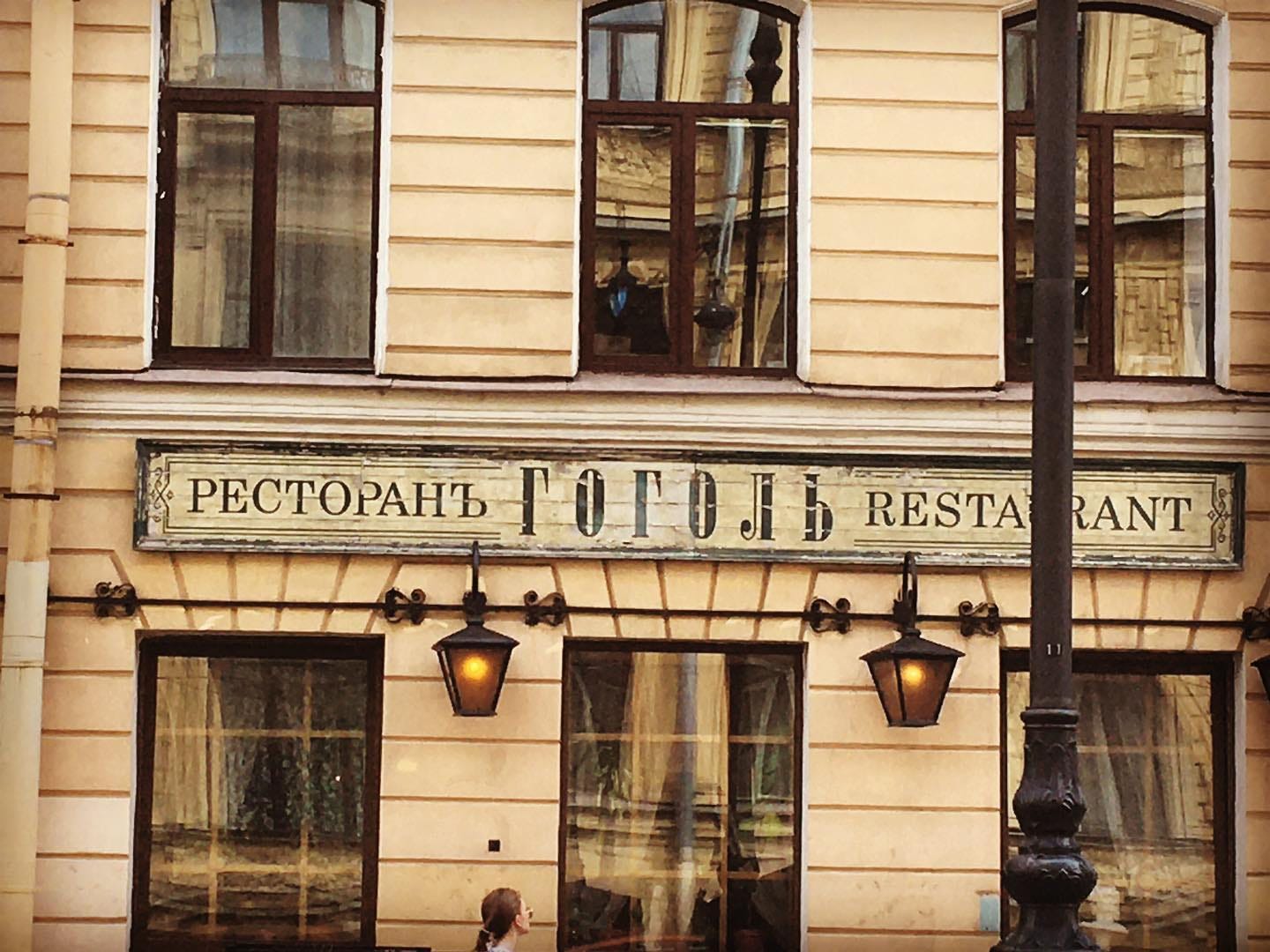
In Moscow, Matrona of Moscow, blind, with flesh over her eye sockets, Matrona, hands raised to Heaven, she who heals the body of the penitent, people come from all over Russia and wait, since it’s Moscow, the lines are larger, there are more people, it’s not enough to touch the walls, you must wait, stand in line, suffer. Here the choir is all female and it is the sound of angels… outside are the gypsy women with children who look like they’ve been dragged through mud, they accost you, the babushki, hands out, making the sign of the cross, with icons of Matrona or Nicholas of Myra. They stretch their arms and wail, these tatterdemallions, the Russians never, walk, walk away, silently, to wherever, let the city move you along. See the Seven Sisters, see the cathedral, St Isaac’s, see summer hardens winter paths, see the rain fall and flowers rise, that yellow thing on the sky has returned, it’s looking at you, at the women, the churches, the beards, and somewhere winter is preparing to storm into the city.
Matrona was popular in her lifetime as a healer and a seer. There is an apocryphal story Stalin and Matrona met. Some say she was hiding from him, Stalin like Caesar in his time could have found her. She survived, of course. Her relics might be the most popular religious sight in Moscow…that tourists don’t know about.
Moscow opens you, Peter opens your mouth, both open your eyes, the space between opens what soul you have left after living in the modern world. Don’t care if you’re an atheist, agnostic, your suprasense of yourself awakens in an instant here.
I’m not here to ramble on about groceries or blue collar districts that look like Brooklyn, that’s not my bag, my thing is to show Moscow and Peter.
Notes from the decade before:
In another car a woman carries an oar, not two, just one. One oar. All else about her is nondescript. I remember her oar and her grandson. Her face is blank. She is asleep to millinery, to flowers on the face of cretins, or to her grandson staring at the floor.
Across from her is a floured babushka: hair, hat, jacket, scarf all blindingly white. Her eyebrows are penciled, she looks at the one-oared babushka. She looks as if to say, you are pathetic. I, who came from Heaven, I ride this metro, going nowhere important, with all of my steering intact, no need for oars, and you, attacked by sleep, one oar, one grandson, be grateful, one-oared suka, that I am an angel of tepid life, not death. I leave and not another person leaves with me.
November, 2015
On March 21st the calendar said Spring Officially Starts. That day was very cold and snow still clung to the ground in dirty patches. Between a copse of birches outside my window the cold was so severe that the snow had melted when the birds sang and the temperature had frozen the melted water to a surreal mirror on the ground, a strange mirror with 12 trees sticking out.
Today, the air smelled undead, uncold. Tajiks were whistling, painting trash bins green. They swept dirt. Miraculously the snow from last week was gone. Spring in Moscow begins when Tajiks paint everything green and the smell of gasoline is in the weak blue air on the first day of life.
March 22, 2016
Friday. Single women. All gorgeous. An old man, sitting, looking seasick, gray-skinned. Suddenly spewing a pink jet of nonsense. Nobody shrieks, screams, just a few men and women saying Grandfather, are you ok?
Returning home, ad nauseam, aim struck by Russians, silent. At first, I thought “gloomy bastards,” now I realize they just aren’t given to senseless smiles. If they smile, they mean it.
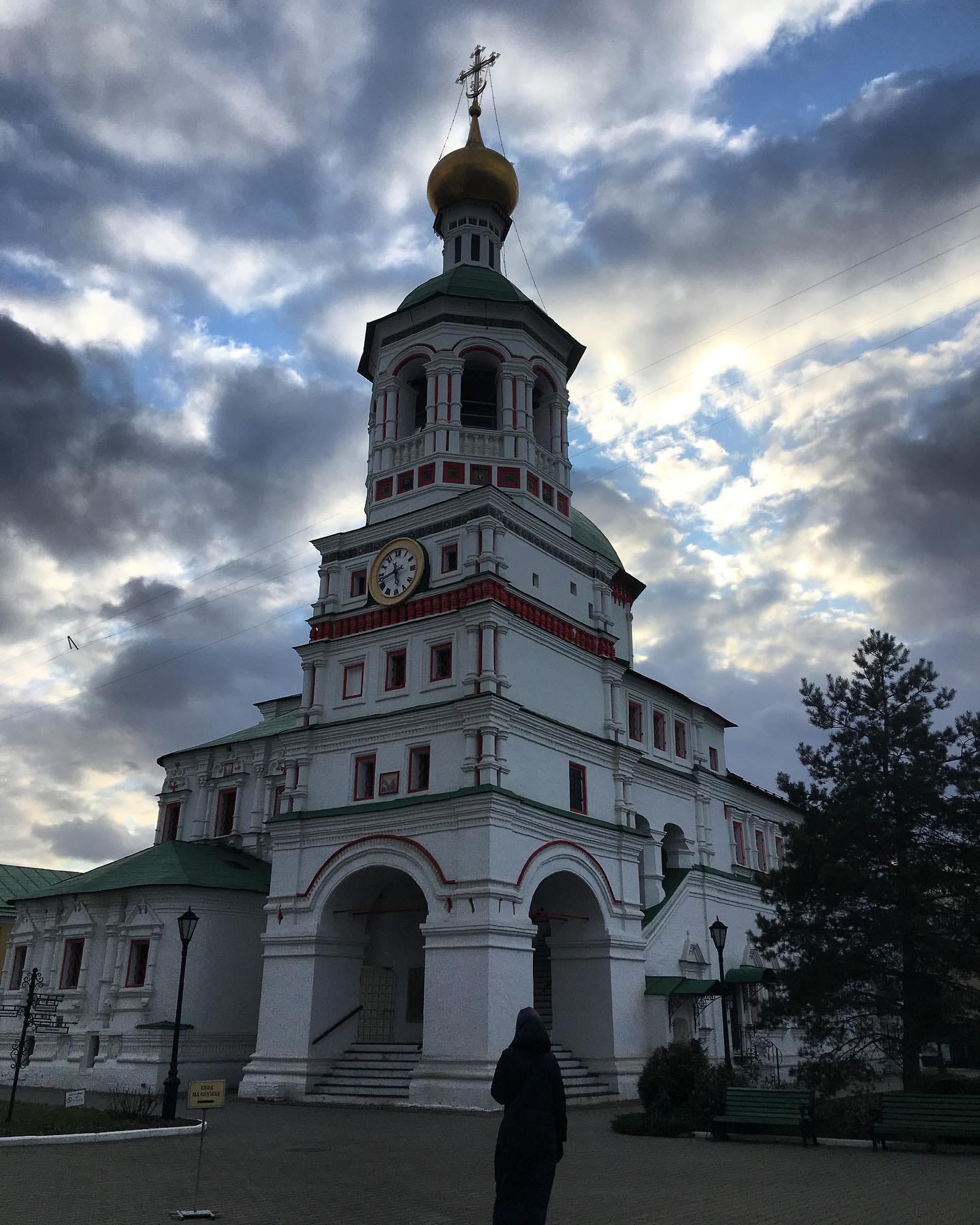
Man sleeping standing, business suit, hugging telephone pole…
Millinery is alive in Moscow.
…Russia is not a secret, insomnia is the answer, don’t sleep for years, sleep badly and they make sense. Every aspect of this country makes sense now. They’re just sleep-deprived.
The tallest grandmother I’ve ever seen, a grandfather in green slacks, green military sweater, a flat top, piercing glacier blue eyes, a Roman nose, a hickory cane, keeps glancing at her. I can see she was once married to someone famous and/or powerful, she still loves him, her back is the straightest back I’ve ever seen. Love keeps us straight.
Easter, the church is full, hundreds outside, the peasants used to believe that Christ was actually being resurrected again, every Easter. Not in Palestine but in Russia, in every Russian church. That’s some heavy stuff. Whatever, we can’t go in, we stayed for an hour, freezing, walked around three times and left, the year before in Pimen Novoslobodskaya, we stayed inside.
Are there wolves in the Tatar forests? Out there, I asked a Tatar drunk. Volk kusy tebya. Wolves eat you. I laugh. He stumbles toward the wooden green mosque.
The janitor has a beard, and a cow walks on the Caspian beach. The janitor has muscles, he looks at me, asks if I can wrestle. No, I am used to boxing, I say. I’d beat you. Every Dagestani has this look, crippled, fat, about to die, doesn’t matter, they all seem to want to test physical reality.
She’s famous, I’m not. She stands lithe and blonde. She’s angry, my lips! An assistant runs to touch her lips with a tissue. Wow. Another five hours of this shit? Man, muscles, walking down the street in Butovo, vodka bottle, blood all over him, glares at me, walks to metro, gets on. The guard a portly Tadjik just stares.
Statues, pigeons
This morning, hungover, all four sides of my existence quaking, physical, emotional, psychological and superspiritual, pained, I walked outside and saw an Aborigine woman. My mouth fell open, drool came out. I felt embarrassed. What the hell is she doing here? I need a drink. Damn.
2016, January 12
I’m not here to tally up her problems, every English book on Russia likes to moan and whine about Russia’s past, her problems, not me.
I spent many weeks in Fedorskie, in Tverskaya Oblast. The silence here, I collected like gold. Only Alaska was this quiet. Sasha, an old shepherd, a cowherd, rather, smiles and says Gemingway. Hemingway. Do you like? He’s my favorite. A cowherd, staff in hand, giant dogs, his herd of cows and a bull move away… The sun in summer sets at 11:00. Once, with my daughter we heard flapping, a flapping noise came from nowhere, suddenly overhead. I look and see dozens of cranes with the hues of the setting sun on their white bodies, their feathers are reflecting it, so instead of white cranes, there are dozens of pink, purple, blue, green cranes moving across the sky, going north, past birch forests, past Kalinin’s birth village, past sleepy cows and calmed Russian bees, past villages of banya, drunk grandfathers, babushki listening to radios, making tvorog. The hedgehogs move, wolves do wolf business, cranes fly and the sun is reluctant to leave the largest country, and in my opinion, not humble by any means, the most beautiful on earth.

